Durable Electrical Cable Chains for Industrial Automation
The Critical Role of Electrical Cable Chains in Modern Industrial Automation
In the demanding landscape of modern industrial automation, the reliable and protected routing of power, data, and fluid lines is paramount. This necessitates robust solutions capable of withstanding continuous motion, harsh environments, and significant mechanical stress. At the core of such applications is the electrical cable chain, an engineered system designed to guide and protect flexible cables and hoses on moving machinery. These sophisticated components ensure operational continuity, prevent wear and tear, and significantly extend the service life of critical electrical and hydraulic infrastructure. Their application spans across diverse sectors, from high-speed CNC machines to intricate robotic systems, underscoring their indispensable role in optimizing industrial efficiency and safety.
Industry Trends and Technological Evolution
The industrial automation market is experiencing unprecedented growth, driven by the push for Industry 4.0, smart manufacturing, and increased demand for customized production. This evolution directly impacts the design and functionality requirements for electrical cable chains. Key trends include the development of lighter, more compact designs that accommodate higher dynamic loads and faster travel speeds. There's also a growing emphasis on modularity, enabling quick installation and maintenance, along with enhanced resistance to aggressive chemicals, extreme temperatures, and UV radiation. The integration of smart features, such as condition monitoring sensors for predictive maintenance, represents the next frontier, promising even greater uptime and reliability in complex industrial setups.
Furthermore, sustainability is becoming a pivotal factor, with manufacturers exploring eco-friendly materials and energy-efficient designs. The drive for reduced noise emissions and vibration in operating environments is also influencing material selection and structural design. As industrial processes become more intricate and require higher levels of precision, the ability of an electrical cable chain to maintain precise bending radii and guide numerous cables without tangling or stressing them becomes a defining characteristic of its advanced engineering.
Featured Product Focus: 38200 mm VMTK High Load Flexible Reinforced Nylon Cable Chain
Our 38200 mm VMTK high load flexible reinforced nylon electrical cable chain is specifically engineered to meet the rigorous demands of textile machinery and other high-dynamic applications. This particular model, with its impressive 38mm inner height and 200mm inner width, provides ample space for a complex array of cables and hoses, ensuring optimal segregation and protection. Constructed from high-strength reinforced nylon, it offers superior resistance to abrasion, fatigue, and common industrial lubricants and chemicals. The VMTK series is renowned for its exceptional load-bearing capacity and resilience, making it an ideal choice for machinery operating with continuous, high-speed movements, thereby guaranteeing long-term operational integrity and minimizing costly downtime.
Detailed Manufacturing Process and Quality Assurance
The production of a high-performance electrical cable chain involves a precise multi-stage manufacturing process, beginning with the selection of premium-grade raw materials. For our reinforced nylon chains, we utilize a specialized polyamide blend, often PA6 or PA12, fortified with glass fibers to enhance tensile strength, stiffness, and heat deflection. The core manufacturing method is high-precision injection molding, where molten reinforced nylon is injected into meticulously designed molds under high pressure. This process ensures dimensional accuracy, consistent material distribution, and optimal mechanical properties for each link and separator.
Following molding, components undergo a precise cooling and deburring stage to remove any flash and ensure smooth edges, critical for cable longevity. Assembly is performed with high-precision automated machinery, ensuring perfect fit and articulation between links. Each assembled segment then undergoes rigorous quality control, including dimensional checks, pull tests, and dynamic cycle testing to simulate real-world operating conditions. Our products adhere strictly to international standards such as ISO 9001 for quality management systems, ensuring consistent product excellence. For applications in specific industries like petrochemical or wastewater treatment, materials are often selected for their advanced corrosion resistance against various alkalis, acids, and solvents. The expected service life of these robust chains, depending on application specifics, can range from millions to tens of millions of cycles, significantly contributing to energy efficiency by reducing frictional losses and preventing cable damage.

Technical Parameters and Performance Data
Understanding the critical technical parameters is essential for selecting the appropriate electrical cable chain for your specific industrial application. These parameters dictate the chain's capacity to handle various loads, speeds, and environmental conditions. Our VMTK series, for instance, offers superior dynamic performance, characterized by its low-noise operation and minimal vibration, even at high travel speeds up to 10 m/s and accelerations up to 50 m/s². The precision of its articulation ensures a consistent bending radius throughout its travel, preventing undue stress on the enclosed cables and hoses.
Below is a generalized table presenting typical technical parameters crucial for evaluating an electrical cable chain, which can vary based on specific series and design:
| Parameter | Typical Range / Value | Unit |
|---|---|---|
| Inner Height (Hi) | 10 - 80 | mm |
| Inner Width (Wi) | 15 - 600 | mm |
| Bending Radius (R) | 18 - 450 | mm |
| Max. Travel Speed | 5 - 10 | m/s |
| Max. Acceleration | 10 - 50 | m/s² |
| Operating Temperature | -30 to +130 | °C |
| Material | Reinforced Nylon (e.g., PA6/PA12 with GF) | - |
| Estimated Service Life | 2 to 50 million cycles | Cycles |
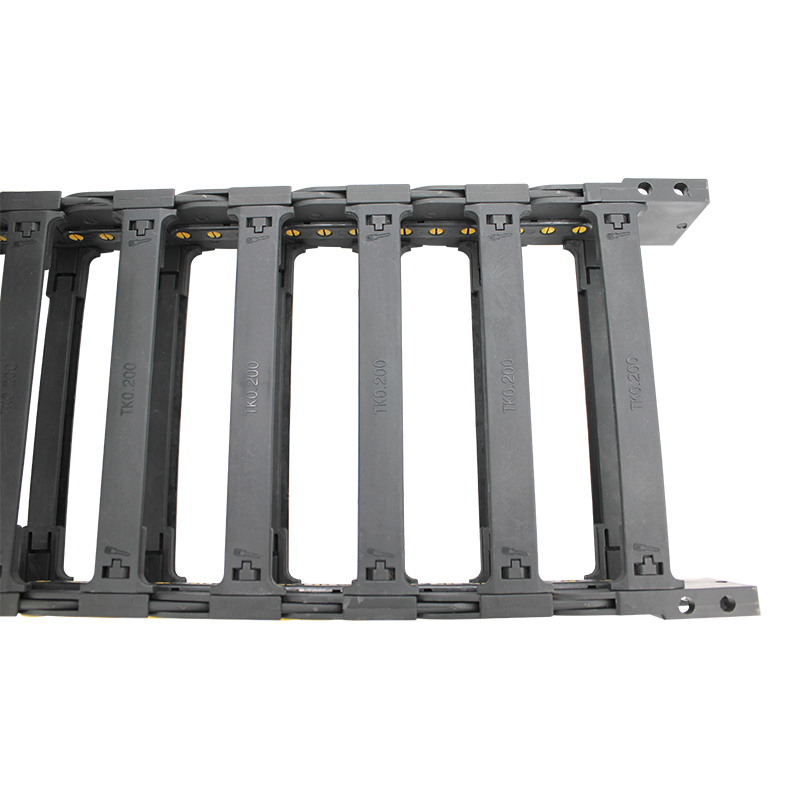
Key Technical Advantages for Industrial Applications
The inherent design and material properties of our electrical cable chain solutions offer a multitude of technical advantages critical for high-performance industrial environments. Durability is paramount; the use of high-grade reinforced nylon ensures exceptional resistance to wear, impact, and chemical degradation, outperforming traditional steel chains in many corrosive or lightweight applications. Their modular design facilitates easy assembly and disassembly, simplifying maintenance and enabling rapid adjustment to cable configurations. Furthermore, the internal separator systems allow for precise compartmentalization of cables, preventing twisting and entanglement, which is crucial for maintaining signal integrity and power flow in dynamic operations.
Beyond structural integrity, these chains excel in operational efficiency. Their optimized glide properties minimize friction, leading to reduced energy consumption and quieter operation compared to unsupported cables or less advanced guiding systems. The ability to handle complex movements, including multi-axis applications and long travel distances, without compromising cable integrity significantly enhances overall system reliability. For specialized environments, variants offering enhanced resistance to UV radiation, extreme temperatures (from sub-zero to high-heat processing), and even ATEX compliance for explosive atmospheres are available, showcasing the versatility and robust engineering behind modern electrical cable chain technology.
Typical Application Scenarios
The versatility of electrical cable chains makes them indispensable across a broad spectrum of industries requiring reliable motion control. In the manufacturing sector, they are critical for CNC machining centers, automated assembly lines, and robotic arms, where continuous, precise movements are the norm. The textile industry, for which our 38200 mm VMTK chain is ideally suited, relies on them for guiding cables on weaving machines, knitting machines, and dyeing equipment, ensuring smooth operation in challenging, often humid or lint-filled environments.
Beyond manufacturing, these chains find extensive use in material handling systems like cranes, conveyors, and automated storage and retrieval systems (AS/RS). In the energy sector, they are deployed in wind turbines and solar panel tracking systems to manage dynamic cable runs. Environmentally demanding industries such as petrochemical, metallurgy, and water/wastewater treatment plants utilize specialized corrosion-resistant electrical cable chain variants to protect essential electrical and hydraulic lines from aggressive chemicals, high temperatures, and abrasive particles, preventing system failures and ensuring continuous operations.
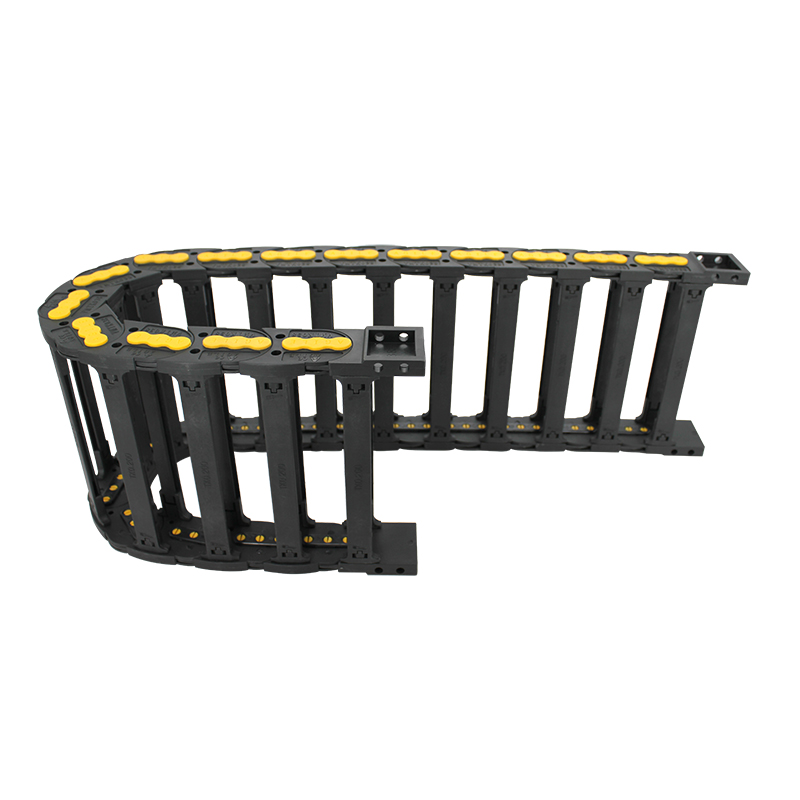
Choosing the Right Manufacturer: Key Considerations
Selecting a reputable manufacturer for electrical cable chain solutions is as crucial as the product itself. The choice directly impacts long-term performance, reliability, and total cost of ownership. Key factors to consider include the manufacturer's experience and reputation in the industry, their adherence to international quality standards (e.g., ISO 9001, CE, RoHS), and their breadth of product offerings to ensure a solution precisely matches your application's technical specifications. A manufacturer with extensive R&D capabilities will also offer innovative solutions and robust testing protocols, including millions of test cycles under various load conditions to validate lifespan and performance.
Beyond product quality, assess the manufacturer's technical support, including design assistance, installation guidance, and after-sales service. A strong commitment to customer satisfaction, evidenced by responsive support teams and a comprehensive warranty program, ensures peace of mind. Furthermore, consider their ability to provide custom solutions, as off-the-shelf products may not always perfectly fit unique or highly specialized machinery requirements. A truly professional partner will prioritize a consultative approach, working closely with clients to develop tailored cable management systems that optimize performance and minimize operational risks.
| Feature | High-Tier Manufacturer | Standard Manufacturer |
|---|---|---|
| Material Quality | Virgin, high-performance reinforced polymers (e.g., glass-fiber PA6/PA12) | Standard polymers, potentially with recycled content affecting performance |
| Design Innovation | Patented designs, modularity, integrated strain relief, smart features | Conventional designs, limited customization |
| Testing & Validation | Millions of cycles, environmental chambers, third-party certification (e.g., UL, CSA) | Basic functional testing |
| Customization Capability | Extensive, including custom sizes, materials, mounting brackets, engineering support | Limited to standard modifications |
| Technical Support | Dedicated engineering support, application specialists, comprehensive documentation | Standard customer service |
Customization Solutions for Unique Demands
Recognizing that industrial applications often present unique challenges, we offer comprehensive customization solutions for our electrical cable chain products. This bespoke approach allows us to tailor every aspect of the chain to specific operational requirements, ensuring optimal performance and integration. Customization options extend beyond standard sizes and bending radii to include specialized materials for extreme environments, such as flame-retardant versions, ESD (electrostatic discharge) compliant materials, or those with enhanced resistance to specific chemicals like acids or solvents often found in chemical processing or oil and gas industries.
Furthermore, internal partitioning systems can be custom-designed to accommodate a precise combination of cables, hoses, and pneumatic lines, optimizing space utilization and preventing wear. Unique mounting brackets and attachment points can be engineered to seamlessly integrate with existing machinery designs, minimizing installation complexity and maximizing compatibility. Our engineering team collaborates closely with clients, utilizing advanced CAD software and simulation tools to develop and validate custom electrical cable chain solutions, ensuring they meet exact specifications for load, speed, environmental conditions, and expected lifespan. This consultative process guarantees a perfect fit and long-term reliability for even the most demanding custom projects.
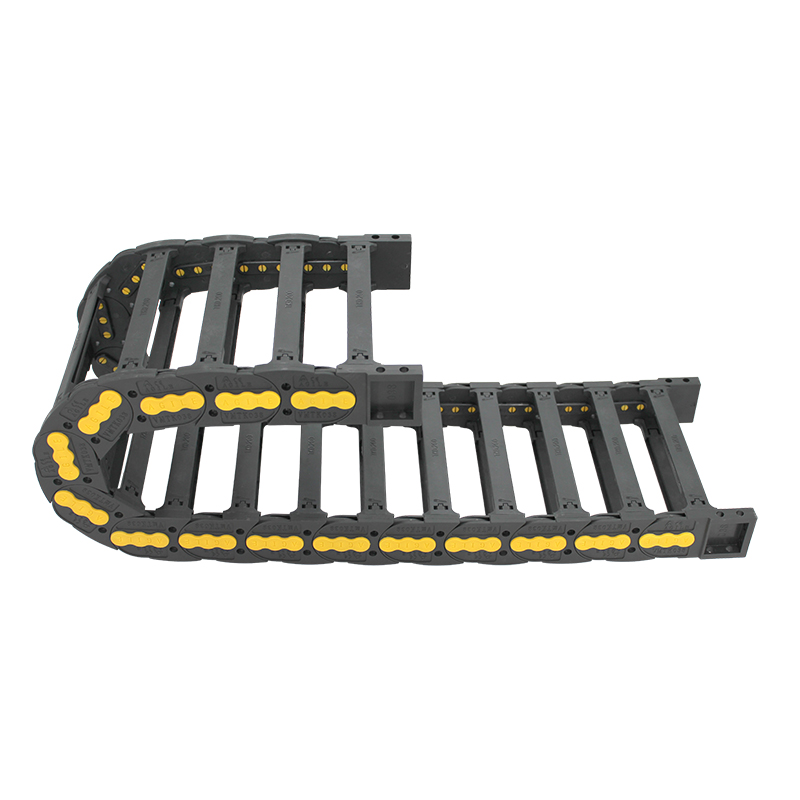
Real-World Application Cases and Success Stories
Our electrical cable chain solutions have been successfully deployed in a multitude of demanding industrial environments, consistently delivering enhanced performance and reliability. For instance, in a large-scale automotive manufacturing plant, our heavy-duty cable chains were integrated into a robotic welding line. This application required the chains to withstand high temperatures, abrasive welding spatter, and continuous high-speed motion. The robust design and specialized material composition ensured uninterrupted operation, significantly reducing maintenance intervals and extending the lifespan of critical robotic cables by over 40% compared to previous solutions.
Another notable case involves a modern textile mill that upgraded its high-speed weaving machines with our 38200 mm VMTK high load flexible reinforced nylon electrical cable chain. The previous cable guiding systems suffered from premature wear due to constant flexion and the presence of fine textile fibers. Our VMTK chain's smooth internal surfaces and robust hinge design effectively eliminated cable abrasion and entanglement. This led to a substantial reduction in machine downtime attributed to cable failures and an improvement in overall production efficiency, validating the specific design strengths of the VMTK series for the textile industry. These examples underscore our commitment to providing reliable, high-performance solutions that directly translate into tangible operational benefits for our clients.
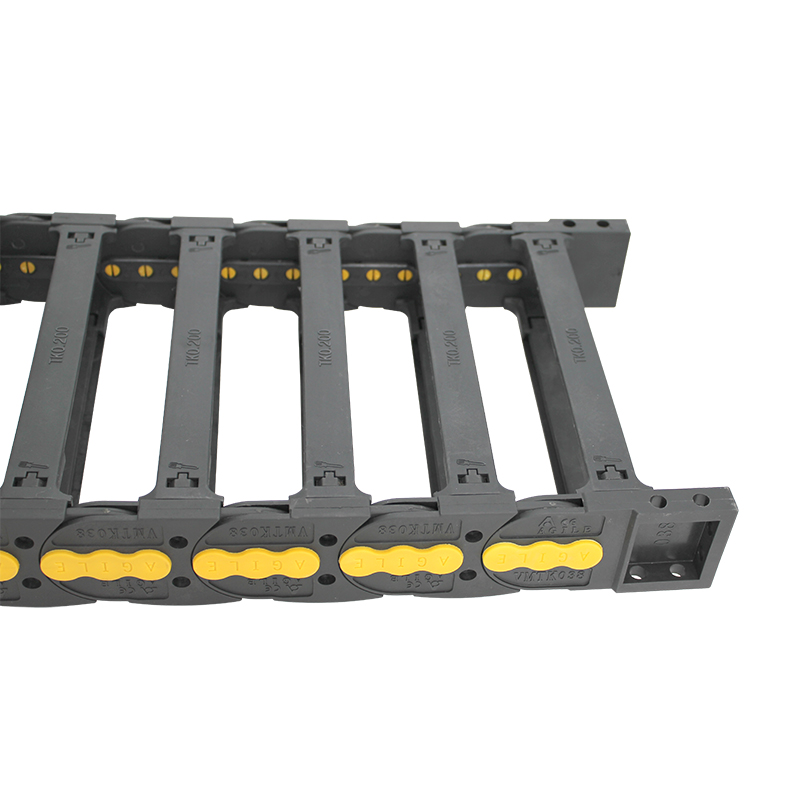
Ensuring Reliability: Certifications and Standards
Our commitment to delivering highly reliable and safe electrical cable chain solutions is underpinned by strict adherence to international quality and safety standards. All our manufacturing processes are certified under ISO 9001, guaranteeing a consistent and superior level of quality management from design to delivery. Products intended for European markets comply with CE directives, while those requiring specific material safety standards often meet RoHS (Restriction of Hazardous Substances) criteria, ensuring environmental responsibility. For specialized applications, our chains can be manufactured to conform to standards such as UL (Underwriters Laboratories) for electrical safety or ATEX for use in potentially explosive atmospheres, showcasing our capability to meet diverse regulatory requirements.
Beyond general certifications, our products undergo rigorous internal testing, including millions of dynamic cycles on dedicated test rigs to simulate years of continuous operation. This includes testing for tensile strength, torsion resistance, and overall structural integrity under varying load and environmental conditions. We also conduct material property tests to confirm resistance to chemicals, UV radiation, and temperature extremes. This comprehensive testing regimen, combined with a transparent data-driven approach, provides our clients with verifiable assurance of our products' exceptional performance and long-term reliability, fostering deep trust in our engineering capabilities.
Frequently Asked Questions (FAQ)
- Q: What is the primary benefit of using reinforced nylon for an electrical cable chain?
A: Reinforced nylon offers a superior combination of high tensile strength, excellent fatigue resistance for dynamic applications, lightweight properties, and robust resistance to a wide range of industrial chemicals and abrasion, making it ideal for harsh industrial environments. - Q: How do I select the correct inner dimensions for my electrical cable chain?
A: The inner height and width should accommodate all cables and hoses with sufficient clearance (typically 10-15% extra space) to prevent compression and allow for natural movement. Consider the largest outer diameter of your cables/hoses and the total required space. - Q: Can these cable chains be used in outdoor or extreme temperature applications?
A: Yes, specialized materials and designs are available for outdoor use (UV resistance) and extreme temperatures (both high and low). It is crucial to specify these requirements during the consultation phase to ensure the correct material grade is selected. - Q: What is the typical lifespan of an electrical cable chain?
A: Depending on the specific model, application conditions (speed, acceleration, load, environment), and proper installation, our high-quality cable chains are engineered for a service life of millions to tens of millions of cycles, typically lasting many years in continuous operation.
Delivery Timelines and Comprehensive Support
We understand the critical nature of timely delivery in industrial projects. For standard electrical cable chain products, our typical lead time ranges from 2 to 4 weeks, depending on order volume and current stock levels. Custom-engineered solutions may require a longer lead time, generally between 6 to 10 weeks, to account for design, prototyping, and specialized manufacturing processes. We maintain transparent communication throughout the order fulfillment process, providing regular updates to ensure clients are fully informed of their delivery status.
Our commitment extends beyond product delivery to comprehensive customer support. All our electrical cable chain products are backed by a robust warranty, typically 1 to 3 years, covering manufacturing defects and material integrity under normal operating conditions. Our dedicated technical support team is available to provide expert guidance on product selection, installation, and troubleshooting, ensuring optimal performance throughout the product lifecycle. We offer detailed installation guides, CAD models, and engineering support to facilitate seamless integration into your existing systems, emphasizing a partnership approach to client success.
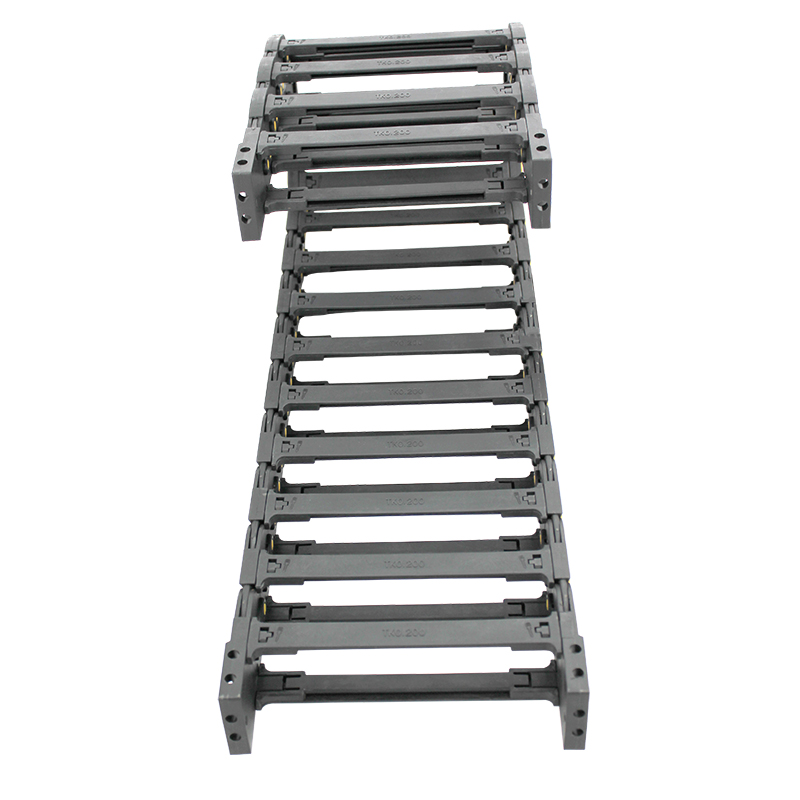
Conclusion
The selection of an appropriate electrical cable chain is a strategic decision that profoundly impacts the efficiency, safety, and longevity of industrial machinery. As automation technologies continue to advance, the demand for sophisticated, durable, and adaptable cable management systems will only increase. Our 38200 mm VMTK high load flexible reinforced nylon electrical cable chain exemplifies the pinnacle of engineering excellence, specifically designed to meet the rigorous demands of sectors like textile manufacturing. By leveraging advanced materials, precision manufacturing, and comprehensive quality control, we deliver solutions that not only protect vital electrical and hydraulic lines but also contribute significantly to the overall reliability and performance of your industrial operations. Partner with us to ensure your machinery operates at its peak, supported by the most advanced cable management technology available.
References
- Smith, J. A. (2022). Advances in Polymer Engineering for Industrial Applications. Journal of Materials Science and Engineering, Vol. 15, No. 3, pp. 112-128.
- Chen, L., & Wang, Q. (2021). Dynamic Analysis and Design Optimization of Cable Management Systems in High-Speed Automation. IEEE Transactions on Industrial Electronics, Vol. 68, No. 10, pp. 10234-10245.
- European Committee for Standardization. (2020). EN ISO 9001:2015 Quality Management Systems – Requirements.
- Robotics Industries Association. (2023). Industrial Robot Safety Standards and Best Practices Guide.








